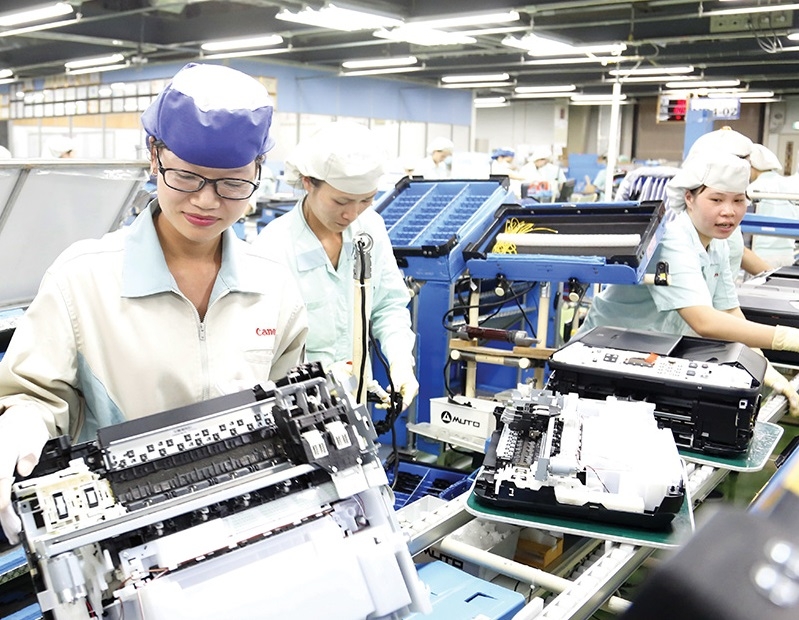New large-scale ventures promise more to follow
 |
| Vietnam is quickly appreciating among foreign investors looking to buttress ailing growth. Photo: Duc Thanh |
Although in the first half of 2020, foreign direct investment (FDI) inflows have seen signs of decrease on-year, the country can still attain remarkable changes in its attraction of such funding in the latter half of the year if numerous large-scale projects are licensed and a new wave of investment is relocated to the country in the midst of pandemic upheaval.
In late May, Quang Ninh Economic Zones Management Authority granted an investment certificate to Texhong Knitting (Hong Kong) to implement a knitting factory project with the total investment capital of $214 million at Texhong Hai Ha Industrial Park.
The project will cover a land area of more than 249,900 square metres, with the goal of producing knitted fabrics. The initiative will need to employ more than 2,700 workers.
Earlier in March, in a working meeting with the prime minister, Tao Hui, general director of Texhong Vietnam, said that the group had plans to pour an additional $500 million into Vietnam this year. The aforementioned project is the first disbursement.
In the south, Japan’s AEON Group is preparing to invest in a large-scale shopping centre in Can Tho city. AEON Vietnam has also rented a separate facility in the northern city of Haiphong.
Moreover, Taiwan’s Pegatron Corporation, a partner of Apple, will reportedly invest $1 billion to set up production facilities in Vietnam, becoming Apple’s latest assembly partner to establish a presence in the country to diversify beyond China, following Foxconn which is already preparing for its expansion in Bac Giang and Bac Ninh provinces.
Once these plans are realised, Vietnam may be assured about its expected registered FDI for the whole year of reach almost $40 billion, with a series of satellite projects expected to come to Vietnam to serve these sizeable projects.
However, to create favourable conditions to lure new investment capital inflows, insiders said that it will be necessary to resume international flights. Europe has joined the groups of economies calling for Vietnam to resume international flights, with the country controlling and preventing the spread of the coronavirus which is currently ravaging the entire globe. Vietnam’s reputation as an attractive destination for foreign investors planning to diversify supply chains is being boosted thanks to the good showing it gave over the past months.
Along with Europe, the governments of South Korea, Japan, Thailand, and Australia are proposing the Vietnamese government to resume international aviation services, which is an important move to recover not only investment but commerce and tourism too.
The Civil Aviation Administration of Vietnam has proposed the Ministry of Transport to resume international flights in late July in the context that numerous countries are considering a “travel bubble” policy. The policy would essentially be an exclusive partnership between neighbouring or nearby countries that have demonstrated considerable success in containing and combating the COVID-19 pandemic within their respective borders.
Vietnam has already considered resuming flights to some Asian destinations, with Tokyo, Seoul, mainland China’s Guangzhou city, Taiwan, and Laos all considered.
In response to these proposals, Nguyen Xuan Phu, CEO of home appliance producer SUNHOUSE Group, said the company often organises business trips abroad and joins international fairs, as well as welcomes foreign business partners, and so it is acutely aware of the importance of reopening international flights.
“Instead of the present complete ban, Vietnam should issue flexible policies. The country could reopen for foreigners from countries where the pandemic situation is controlled and people have little risk of carrying the virus,” Phu said. “In addition, when they arrive in Vietnam, it would be necessary to have tools (for example electronic bracelets) to track their movements and ensure isolation is followed.”
Earlier this year, the Ministry of Planning and Investment (MPI) built plans to boost Vietnam’s FDI appeal in 2020 to mitigate the impacts of the pandemic. According to statistics by the ministry’s Foreign Investment Agency, in the first half of the year, the total registered FDI reached $15.67 billion, down 15.1 per cent on-year. However, added capital in existing projects hit $3.7 billion, up 26.8 per cent.
What the stars mean:
★ Poor ★ ★ Promising ★★★ Good ★★★★ Very good ★★★★★ Exceptional
Related Contents
Latest News
More News
- VNPAY and NAPAS deepen cooperation on digital payments (February 11, 2026 | 18:21)
- Vietnam financial markets on the rise amid tailwinds (February 11, 2026 | 11:41)
- New tax incentives to benefit startups and SMEs (February 09, 2026 | 17:27)
- VIFC launches aviation finance hub to tap regional market growth (February 06, 2026 | 13:27)
- Vietnam records solid FDI performance in January (February 05, 2026 | 17:11)
- Manufacturing growth remains solid in early 2026 (February 02, 2026 | 15:28)
- EU and Vietnam elevate relations to a comprehensive strategic partnership (January 29, 2026 | 15:22)
- Vietnam to lead trade growth in ASEAN (January 29, 2026 | 15:08)
- Japanese business outlook in Vietnam turns more optimistic (January 28, 2026 | 09:54)
- Foreign leaders extend congratulations to Party General Secretary To Lam (January 25, 2026 | 10:01)

 Tag:
Tag:




















 Mobile Version
Mobile Version